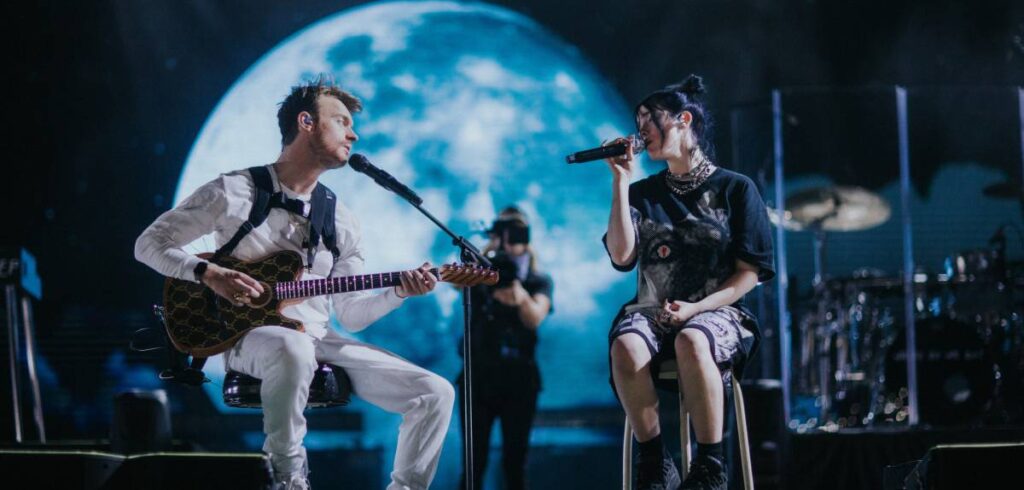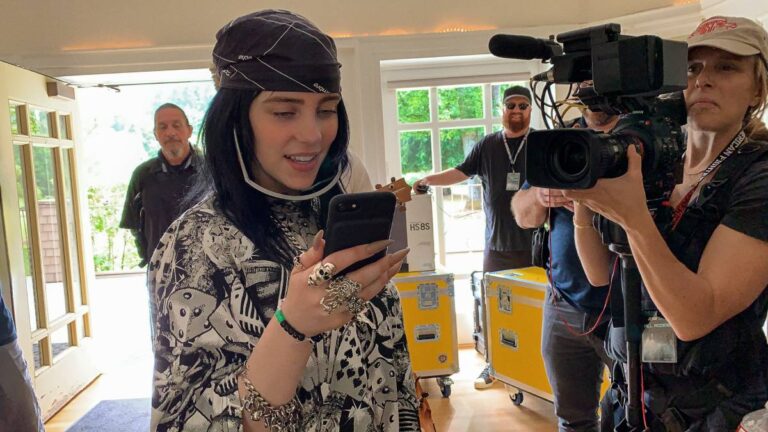Billie Eilish was only 13 years old when “Ocean Eyes” — written and recorded with her brother, Finneas O’Connell — was uploaded to Soundcloud, racking up hundreds of thousands of listens in a matter of days. Director RJ Cutler’s new documentary, Billie Eilish: The World’s a Little Blurry, opens in the wake of that overnight success: we see Billie and Finneas exuberantly high-fiving as their song is played on terrestrial radio, while mom Maggie cheers in the background and dad Patrick looks on warmly. It’s an intimate moment, the first of many we’ll glimpse over the next two hours as the film charts Billie’s rise to superstardom.
Cutler’s camera follows Billie everywhere, from arriving at venues, interacting with fans and performing onstage to texting with her boyfriend, writing in her journal and recording new music with her brother. It’s these latter interactions that become something of a throughline for the entire film, giving the audience an inside look at the writing and recording of Billie’s debut album, When We All Fall Asleep, Where Do We Go? Producing a hit record would be a daunting task for anyone, let along a teenage girl trying to keep her own mental health in check while in the midst of a worldwide concert tour and a tumultuous romantic relationship.
Billie’s openness about her struggle with anxiety and depression is one of the keys to the bond she creates with her audience. “Every person in there is going through something good or bad, something horrible or amazing,” she says of her fans, and she makes the art that she makes “because I have the same problems.” She also recognizes the power of music as a means of expression, and how it can help provide balance when life feels overwhelming: during a writing session, Maggie questions the content of her lyrics. “Are you seriously implying that you would jump off the roof?” she asks. “This song is the reason I don’t,” Billie replies matter-of-factly. “Having this way of saying it, instead of doing it, is better.”

Billie Eilish: The World’s a Little Blurry is packed with live performance clips, but the behind-the-scenes footage from Cutler (and supplemented by Maggie, whose cell phone seems to be permanently recording) is arguably even more engaging. Viewers will see firsthand the sort of mental and emotional toll a life of fame can extract, not to mention the physical ramifications: Billie develops shin splints during one segment of the tour, prompting her father to ferry her around backstage by piggyback (this footage is adorable), and later sprains her ankle minutes into an outdoor performance in Milan. Forced to complete the show seated on a stool, Billie anguishes over the injury, feeling like she cheated the audience out of the experience they paid for.
Although Cutler’s film doesn’t shy away from some heavy emotional beats — there are multiple moments, especially in the second half, that may have viewers reaching for a tissue — there’s also plenty of joy and humor to be had. A running joke about young Billie’s obsession with Justin Bieber, reportedly so pronounced that Maggie considered enrolling her in therapy over it, pays off in surprisingly sweet fashion, and an encounter with Katy Perry at Coachella (with Perry gamely stepping into the role of a big sister trying to prepare Billie for the world to come) turns into a source of hilarity when Billie doesn’t register the identity of Perry’s fiancé until the meeting has already concluded.
Billie Eilish: The World’s a Little Blurry offers a uniquely up close and personal look at someone who, in her own words, is “famous as fuck.” But more importantly, it showcases the real person behind the celebrity, who experiences the same fears, doubts and frustrations as the rest of us, and that’s precisely what makes Cutler’s film so compelling. It’s a story about creativity, connection and humanity, about familial bonds and the importance of taking care of one another — a lesson that feels particularly comforting in these fragile times. “You’re the reason I’m okay,” Billie says to her fans, and the feeling is clearly reciprocal: they love her, and she loves them, because each recognizes so much in the other.

